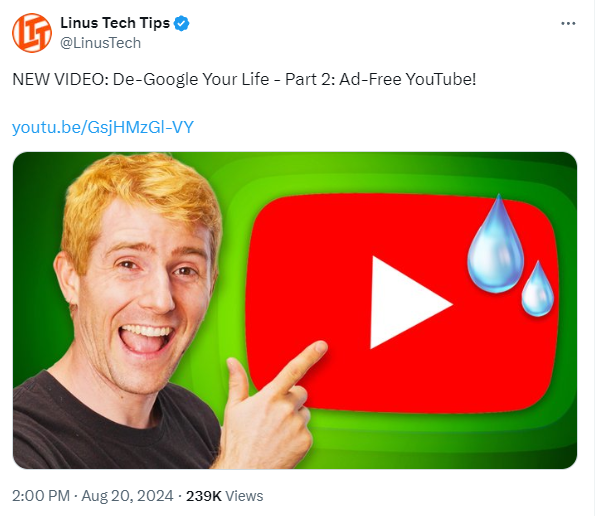https://files.catbox.moe/a6111d.png / https://nitter.poast.org/LinusTech/status/1825956050685800834

If you go the video, https://www.youtube.com/watch?v=GsjHMzGl-VY. You will see it’s gone. So Youtube being Youtube.
Here’s a Odysee mirror of the video, https://odysee.com/@jopec:7/linus-tech-tips-degoogle-your-life-part-2-adfree-youtube:0.


Isn’t that essentially what it is? Getting something for free through certain means you wouldn’t get for free otherwise? Which means no money goes to whoever owns the service you’re using?
Exactly. Getting media without paying (either in currency or in data for ads). Which they also address and talk about plex and jellyfin to consume the newly “liberated” media. I find his opinion on this quite fair.
Piracy is distributing media you don’t own. How does blocking ads equates with acquisition and distribution of media you don’t own? It doesn’t.
Evading advertisement is not piracy.
Piracy refers to the taking, not the giving.
Pirates didn’t sail the seven seas heading out gold to others.
Say you walk up to some person giving out free samples of food. As a condition of taking this free sample, you also must take a pamphlet of advertisements from the people who are giving you the free sample. You take your free sample, and then walk away while dropping the pamphlet in the nearest trash can. That’s essentially what ad blocking is. You’re simply preventing certain parts of a web page from being downloaded to your device. That’s why people have issues with the “piracy” label, because nothing is being “stolen”. You’re just refusing to take all of it.
More accurate comparison would be taking the sample but refusing the pamphlet. Dropping it in the nearest bin would be skipping the ad after 5 seconds.
No, that’s not what ad blocking is. You just described viewing a traditional “1 banner at the bottom/top” ad. There’s a snowball’s chance in hell that you actually check out/click on the ad after seeing it; you throw it away after seeing it. On the off chance you’re intrigued by the ad, you take it home.
That’s not what ad blocking is. There’s no suitable metaphor for ad blocking IRL, but it’d most nearly be raiding the nearest available ad pamphlet warehouse or interrupting the guy who gets the pamphlets to the foodgiver. Sure, the difference is that nobody gets the ads anymore, but that’s not a bad thing for you, is it? The foodgiver gets no ad revenue for now until delivery is re-established.
The thing being stolen is the advertisers ability to advertise, which in turn pays for the platform. So, it is stealing from the platform.
Also, if you take a quick look at the pamphlet and throw it away, that’s the same thing as looking at an ad and ignoring it afterwards. You were still looking at it, so the ad did its job.
Btw, don’t get me wrong, I also use ad blockers for a lot of things. But I do pay for anything that I use for a good amount of time, like Youtube, video games, movies or music.
Nope, you’re not taking anything away from the advertiser. They are free to display but they’re not entitled to being watched. You don’t get penalized for ignoring or closing your eyes during trailers at the cinema. But that is exactly what arguing against ad blockers is. The entitlement of advertisers to your attention. This fundamentally breaks the social contract of ads. Imagine corporations arguing that municipal anti-billboard laws are theft
jinx!
Does that make me a pirate if I go to the bathroom during commercial breaks? If I get to a theater late and miss the commercials, am I a pirate?